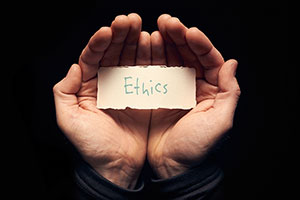Medical examiners are employed by state and local governments to determine a cause of death. Television shows tend to portray medical examiners as forensic detectives. While medical examiners often find information that helps investigators solve crimes, their mission is simply to determine why someone died.
In routine cases, the cause of death is not a mystery. Most states require an autopsy to be performed when the cause of death is suspicious or unknown. Medical examiners often perform autopsies when a death probably resulted from homicide, suicide, an accident, or an occupational hazard. In those cases, a medical examiner typically dissects and examines the body and reviews results of lab tests to determine why a person died. Sometimes the medical examiner will need to sort through multiple causes to determine whether any of them would have been sufficient to cause death in the absence of the others.
In some cases, the cause of death is disputed. Those disputes may arise in criminal cases or in wrongful death lawsuits. When a medical examiner draws conclusions from medical evidence that is open to interpretation, a party may retain a pathologist as an expert witness to offer alternative explanations for a death. It is then up to a jury to decide whether to accept the medical examiner’s opinion.
The Importance of a Second Opinion
While medical examiners are usually reliable witnesses, no witness is infallible. In homicide prosecutions, defense attorneys often submit autopsy reports to independent pathologists to determine whether the medical examiner’s opinion is open to doubt.
Writing for MedPage Today, Dr. Judy Melinek relates the story of a forensic pathologist who was asked by the family of a man who died in police custody to perform a second autopsy. The pathologist noted that the man’s neck had not been fully dissected. When she opened the neck, she found a bag of drugs that was blocking the back of the man’s throat. The pathologist who performed the first autopsy missed a likely cause of death.
The privately retained pathologist told Dr. Melinek that she was accused of planting the drugs. Since autopsies are usually performed in the presence of photographers and lab assistants, planting evidence would typically be a difficult task. Nor was there any reason to believe that the private pathologist had any incentive to do so.
According to Dr. Melinek, however, attacks upon the integrity of privately retained experts are common. One pathologist, for example, discovered a broken hyoid bone that the first autopsy missed. A fractured hyoid bone is rare and is typically caused by strangulation. The pathologist who found the fracture was accused of breaking the bone himself. He was eventually exonerated, but only after years of fighting the false accusation. The accusation has followed the pathologist, making lawyers reluctant to hire him as an expert witness.
The Ethics of Testifying
Medical examiners work for the government. They don’t work for prosecutors. Their job is to advance the truth, not to advance a prosecution. Unfortunately, as Dr. Melnick points out, “there is a subset of prosecutors who believe, and will not be dissuaded, that the investigative work done by a medical examiner always ought to align with the goals of law enforcement. Some forensic pathologists feel the same way.” Those pathologists serve a law enforcement agenda when discovering the truth should be their only agenda.
Dr. Melnick reports that some medical examiners refuse to speak to defense attorneys. A medical examiner should have nothing to hide. Refusing to discuss findings with a defense attorney sends the message that the medical examiner is an advocate for the prosecution rather than an advocate for the truth.
Doctors who are employed by the government sometimes disparage forensic pathologists who are hired by defense attorneys. In fact, an expert who is called to testify by a defense lawyer is bound by the same ethical obligations that should govern the testimony of a medical examiner. The primary obligation is honesty. When a cause of death is a matter of probability and other causes remain possibilities, an honest witness should readily admit that fact.
When Dr. Melnick worked as a pathologist for a medical examiner’s office, she did some consulting work in civil and criminal cases, including work for prosecutors in other counties. Her employer told her that her testimony created a conflict of interest. In fact, there is no conflict in testifying for “the other side” because the truth does not take sides. As Dr. Melnick puts it, “We are neither defense witnesses nor prosecution experts. We are witnesses for the voiceless. We speak for the dead.”
Government employers that restrict the work of pathologists are interfering with a justice system that depends on the honest testimony of expert witnesses. Government employees who launch “whisper campaigns” to destroy the reputations of pathologists who give honest testimony for other parties place their own reputations, and the reputations of honest colleagues, at risk. Nobody trusts an expert who makes groundless attacks upon other experts simply because they follow the evidence to the truth that it reveals.




